Water Crisis in South Sudan
Beleng’s village has no clean water. For weeks her toddler has been drinking the silty mixture from a distant watering hole. It’s shared with livestock and other animals who lie in its puddles for relief from the heat.
Recently her baby boy has had diarrhea, fever, and listlessness. She fears the worst. Polluted water sources that are often the only water source for families like Beleng’s, commonly spread diseases like malaria, typhoid, and cholera – one of the tragic reasons many children here never live to see their fifth birthday.
- 59% of people in South Sudan – 6.3 million – have no clean water
- Filthy water spreads malaria, cholera, and typhoid – leading killers
of children under age 5 - Women and girls walk an average of 12 miles daily to find water
- Women and girls are vulnerable to assault on daily trips to find water
- Women are dying of dehydration in the dry season while hauling heavy containers for miles in soaring heat
- Lack of clean water is intensifying the refugee crisis at the border of Sudan
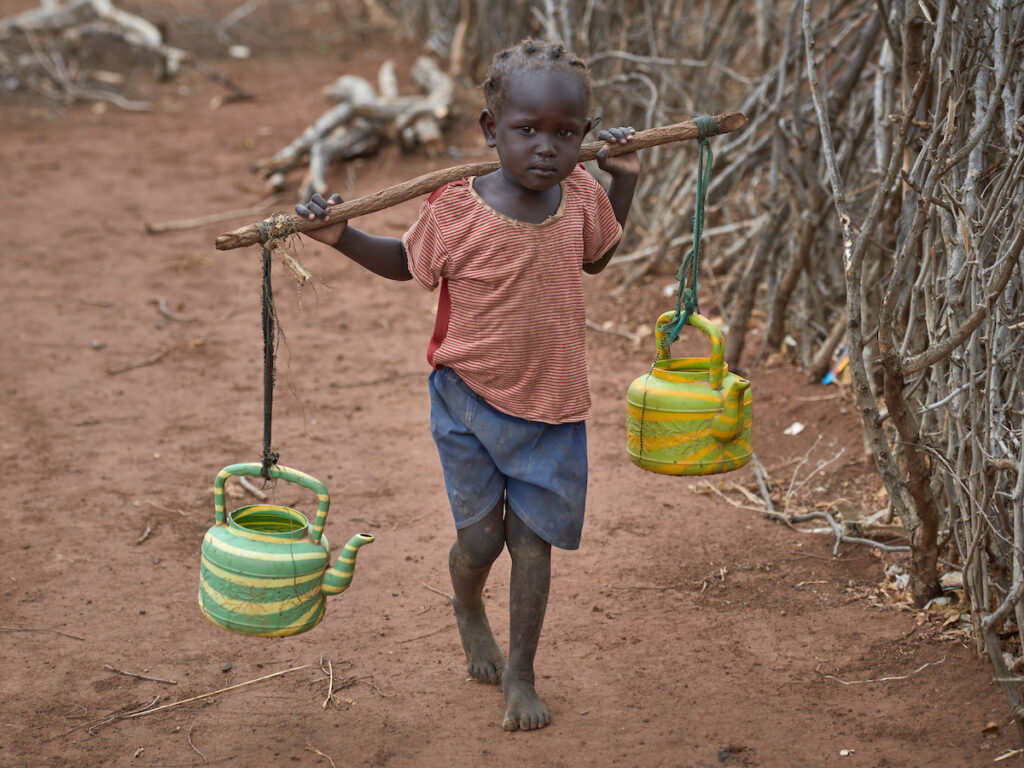
Dirty water that carries disease-ridden bacteria is the #1 killer of young children in South Sudan.
A Terrible Choice
Mothers like Beleng are faced with a terrible choice: to give their children filthy water, often teeming with bacteria and feces, or no water at all.
In most cases, people can survive only three days without it. Something as simple as having a drink of water – an act taken for granted in developed nations – becomes one people die over in South Sudan.
A staggering 59% of the population – 6.5 million people – have no access to clean water. It’s difficult to imagine. But here it’s a treacherous reality, a constant struggle of daily life.
On a recent visit to South Sudan, Matt Smith of Sudan Relief Fund witnessed this plight firsthand. He was shocked to see what families in Western Equatoria drank on a daily basis.
“I saw the water the people are forced to drink without a proper well,” he described. “It’s essentially mud – black and cloudy.”
Saving Women and Girls from Terror
The burden of finding water rests on women and girls in South Sudan. They spend hours walking miles every day to fill 40- and 50-gallon containers and haul it back to their families. But the biggest problem isn’t the physical strain. It’s their personal safety.
Women and girls regularly face risk of assault, beatings, and rape while alone and vulnerable on distant excursions. It’s a terrible reality and constant threat in a nation where gender based violence is common.
No girl should ever endure violence just to get the water she needs to survive.
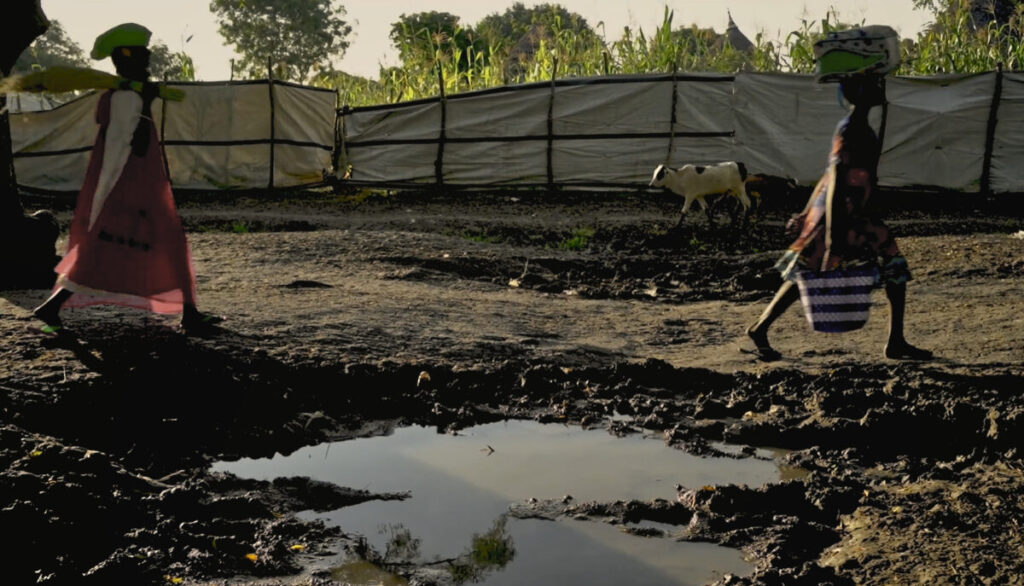
More than half the population of South Sudan has no access to clean water.
Perils of the Dry Season
In South Sudan’s annual dry season, parts of the country experience no rain at all for months at a time. These periods are even more treacherous for families like Beleng, who have no local clean water source – and for women and girls forced to search farther for it. As water becomes more scarce, girls are being beaten and robbed of it by gangs, rival tribes, and thieves stealing the precious commodity.
This year the dry season has been so oppressive, women and girls are dying from dehydration while enduring twenty mile journeys or more to find water, hauling heavy containers in the intense heat. One woman tells of how she saw a mother resting momentarily under a tree. On closer look, she discovered the mother was deceased, as was the infant she still clutched in her arms.
No Water at the Border
South Sudan’s new refugee crisis at the border of Sudan is no exception. The tens of thousands of people fleeing war only put a greater demand on insufficient water supplies. The deficit of clean water for drinking and sanitation worsens as more desperate families stream into the refugee camps. Meanwhile thousands of previous arrivals wait under makeshift shelters or lie in the searing sun, awaiting help.
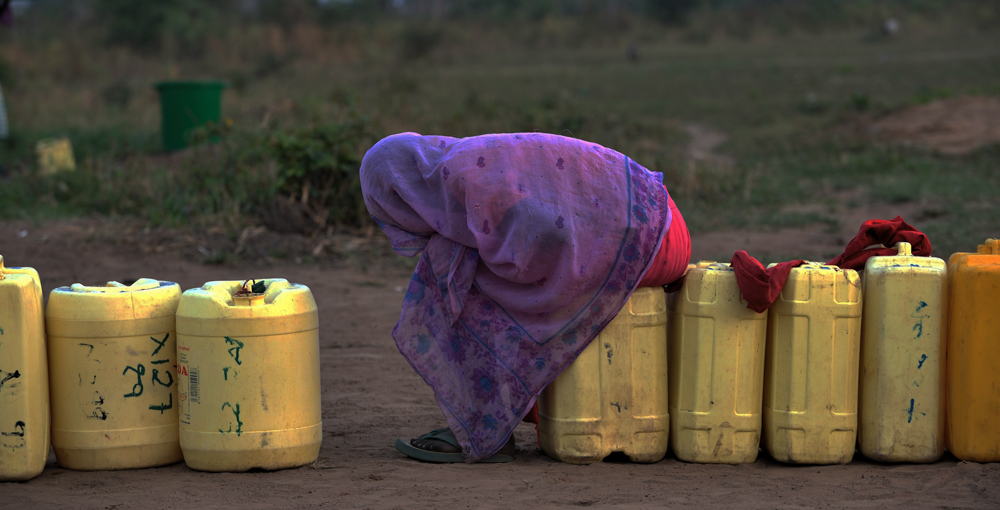
The refugee crisis worsens the water shortage. Yet just one handpump well can bring clean water to a thousand people daily.
An Unnecessary Crisis
Ironically, alleviating the terrible ripple effects from the lack of clean water in South Sudan is relatively simple and inexpensive to achieve. The many tragedies from drinking filthy water can be stopped in their tracks.
To drill a borehole and install a basic handpump well in South Sudan costs approximately $15,000 US dollars. Please read that again. Just $15,000 for one handpump well. A single handpump well can provide clean water for over 1,000 people. That $15,000 can literally save 1,000 lives from disease, dehydration, and death, and change the course of those lives for years to come.
The toddler whose cholera-ridden body is wasting away from tainted water. The girl who endures terror to search for water in perilous territory. The mother who desperately tries to nurse her infant but is too dehydrated to produce food for her baby.
These scenarios and countless more are eliminated – solved by the simple remedy of clean water. Water that is near. Water that is lifegiving.
Sudan Relief Fund’s Matt Smith had the rewarding opportunity to watch a village celebrate over the opening of its new well. The people come out in their best clothes. They dance and cheer and sing for joy.
“We’ve built a number of wells in Yambio for communities that would otherwise have no water,” he said.
“I was just on the ground for the opening of a number of wells and saw the incredible celebrations the communities throw when these wells are opened. You can especially see it on the faces of the women and children.”
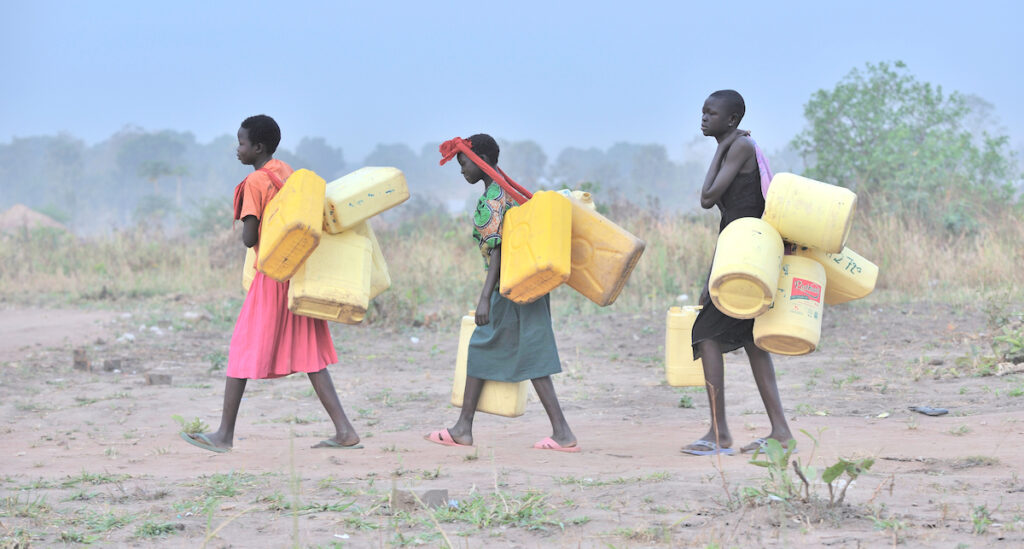
Girls face danger on long journeys to find water. Assault, or worse, is a constant threat.
You Can Make This Possible
With help from donors and partners, Sudan Relief Fund hopes to drill twenty wells in the next twelve months, to bring clean water where people languish without it. Sudan Relief Fund works in underserved areas where other organizations don’t go.
You can help make this happen. Just one well for $15,000 can bring lifesaving clean water to more than a thousand people in need.
Imagine eliminating the diseases from drinking filthy water, preventing children’s deaths from this scourge. Think of the health of an entire community simply by having clean water available. The benefits of sanitation, the presence of water for planting crops and supplying livestock.
Think of the safety you’ll provide women and girls, protecting them from dangers of attack. Preventing trauma. Preventing abuse. Saving their lives.
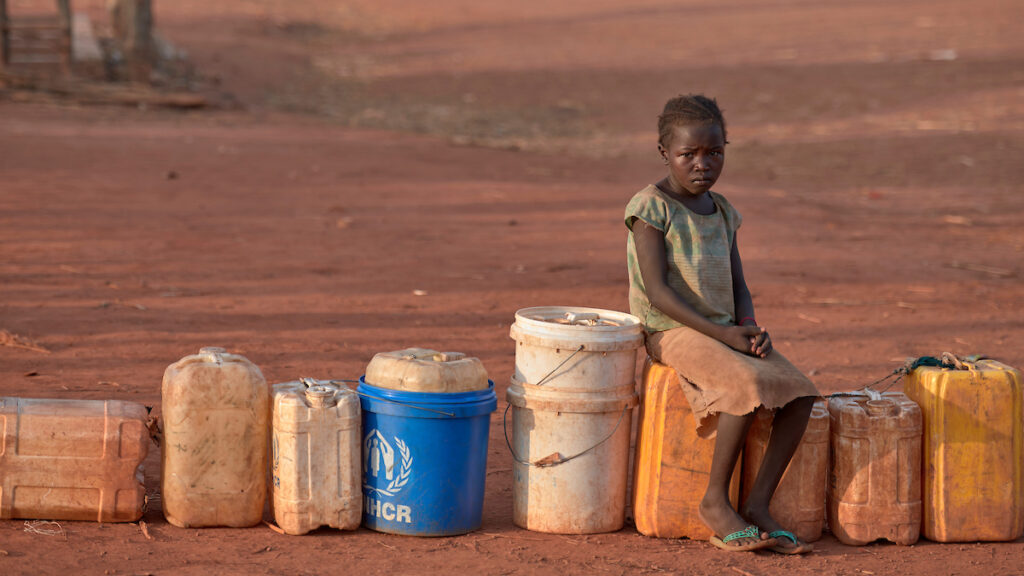
In the dry season, parts of the country see no rain for months at a time.
Imagine the extra time in their day – not having to spend hours searching for water allows women and girls to work at home, or go to school, or pursue small income-generating activities.
An entire community is blessed by the one act of making clean water accessible. Imagine the wealth of change you’ll make for such a small sacrifice. “I was thirsty and you gave me something to drink.” Will you be that someone today?
PS – Clean water is an essential foundation for any healthy community. Please think of how different life would be if you suddenly had no drinkable water. This is the reality for so many. For little expense, we can save thousands of lives with your help.
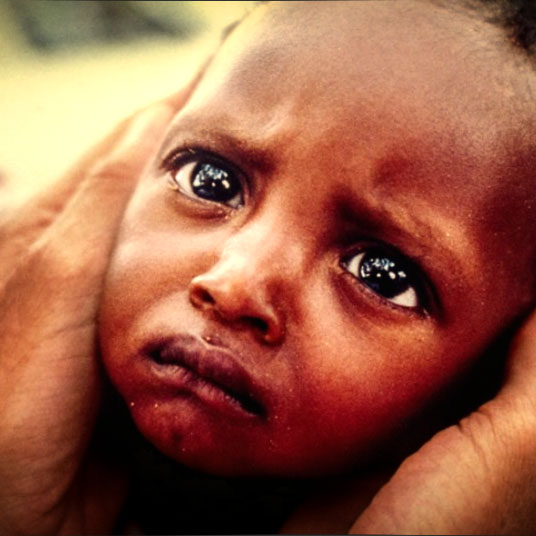 Increase Your Gift at No Extra Cost!
Increase Your Gift at No Extra Cost!
Did you know you may be able to double the amount of your gift without giving an additional dollar of your own? Thousands of companies participate in Corporate Match programs. This means they match dollar-for-dollar the amount their employees donate to charitable organizations – doubling your gift! Imagine creating twice the impact of your contribution.
Learn more about the Corporate Match Program.






